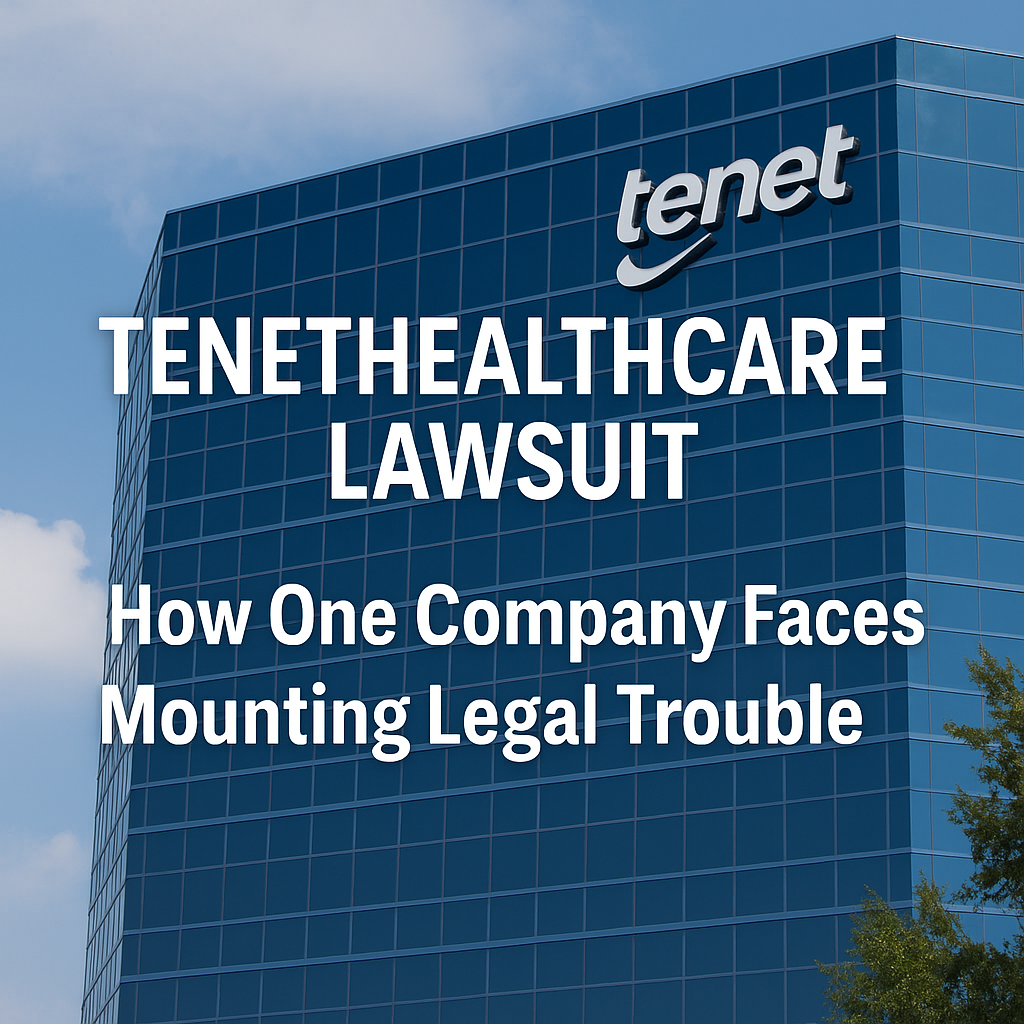The TenetHealthcare Lawsuit is drawing national attention. It focuses on how Tenet may have shared patient data with Facebook and Google. Thousands of patients might have had their health details leaked through website tracking tools. This legal battle isn’t new for Tenet. Over the years, the company has faced fraud charges, billing scandals, and whistleblower lawsuits. Now, data privacy is front and center. This article explores everything you need to know about the current legal claims, past cases, and what it means for you.
Why This Lawsuit Exists
At the heart of the TenetHealthcare Lawsuit is an issue of digital tracking. Lawyers claim that Tenet embedded tools like the Meta Pixel and Google Analytics into its hospital websites. These tools collect data automatically. If you visited Tenet’s websites, filled out symptom forms, or scheduled appointments, your health info may have gone to Facebook or Google. You might not have known. You definitely didn’t approve it.
Now, attorneys argue that this violates multiple privacy laws. Hospitals must protect patient data. Sharing it without permission could break both ethical and legal standards. And that’s exactly what the lawsuit is trying to prove.
How Data Was Possibly Collected
When you visit a hospital’s website, you don’t expect to be tracked. But Tenet may have installed software that did just that. Here’s what likely happened:
Patients Shared Health Details Online
You may have used a symptom checker. Or maybe you filled out a contact form, described an issue, or browsed certain medical services.
Website Pixels Captured That Data
Meta Pixel and Google Analytics record how you move through a site. If embedded on a hospital page, they may capture sensitive details.
Third Parties Received the Data
That information may then have gone to Facebook or Google. It could have been used to target you with ads or build data profiles. This process happens without consent. And that’s why it’s now at the center of the TenetHealthcare Lawsuit.
Types of Legal Claims Filed
The lawsuit includes multiple claims. Each one is serious. Together, they build a strong case against Tenet.
Negligence
Tenet had a duty to protect private health data. Lawyers argue the company didn’t do enough to safeguard that information.
Breach of Implied Contract
Patients expect their hospital to follow privacy laws. Using tracking tools without warning may violate that trust.
Breach of Fiduciary Duty
Hospitals must act in patients’ best interest. Secretly sharing health info with marketers breaks that duty.
Unjust Enrichment
Tenet may have gained from using patient data for commercial benefit. If they made money, that profit could be challenged in court.
Consumer Law Violations
Many states forbid deceptive or unfair practices. Failing to disclose tracking tools likely breaks those laws too. Each of these claims gives weight to the TenetHealthcare Lawsuit and makes it harder for the company to deny wrongdoing.
Who May Be Affected?
This isn’t a small issue. Patients from multiple California hospitals may be eligible to join the case. If you visited these facilities between 2021 and June 2023—and used their websites—you could be part of the lawsuit:
Fountain Valley Regional Hospital
Doctors Hospital of Manteca
Emanuel Medical Center
Lakewood Regional Medical Center
Los Alamitos Medical Center
San Ramon Regional Medical Center
Placentia-Linda Hospital
Hi-Desert Medical Center
Thousands of patients used these websites. Many were never told their data could be shared. That’s what makes this claim so powerful.
What the Courts Have Decided So Far
This case is active. And courts are letting it move forward. That’s big.
In Massachusetts
A federal court let parts of the lawsuit proceed. Some claims—like invasion of privacy—were dropped. But others, including negligence, survived. That keeps the case alive.
In California
A federal judge ruled the class action can continue. Tenet wanted to dismiss the case. The court said no. The decision doesn’t prove guilt. But it means the case has legal merit and will go forward. These rulings show that the TenetHealthcare Lawsuit is not just noise. Judges believe the claims deserve full hearings.
Major Legal Cases Against TenetHealthcare
| Year / Period | Case / Issue | Outcome / Status |
|---|---|---|
| 1990s–2000s | Psychiatric hospital fraud and unnecessary admissions | Settled for $380 million across 28 states |
| 2004 | Unnecessary heart surgeries at Redding Medical Center | $395M settlement plus $54M in fines |
| 2016 | Illegal Medicaid referral kickbacks | $514M settlement and major compliance reforms |
| 2022 | Data breach affecting 1.2 million people | Class action lawsuit pending |
| 2023 | Suspected data tracking using Meta Pixel and Google Analytics | Ongoing investigation and active legal claims |
| 2024–2025 | Class actions and court rulings over digital privacy violations | Claims cleared to proceed by federal courts |
This table shows how often TenetHealthcare has been in legal trouble. The company has paid massive settlements in the past. The pattern continues.
Nurses File Separate Whistleblower Lawsuit
In addition to data tracking, Tenet faces other lawsuits. In Massachusetts, eight nurses sued Tenet’s St. Vincent Hospital. They claim they were fired for reporting unsafe care. They raised concerns and wanted better patient protection. Instead of being heard, they were punished.
This lawsuit is separate from the data privacy case. But it shows a troubling trend—where workers who speak up face retaliation. And it adds another layer of scrutiny to TenetHealthcare’s operations.
Hospital Safety Ratings Spark New Legal Conflict
Tenet also sued a group called Leapfrog. Leapfrog grades hospitals on patient safety. Tenet claimed the ratings were unfair. They said low scores hurt their business. Leapfrog refused to change them. That led to a legal battle.
Now, courts will decide whether safety ratings are protected speech—or whether Tenet has a case for defamation. Again, it shows how Tenet is fighting on multiple legal fronts. The TenetHealthcare Lawsuit isn’t just one case. It’s part of a broader pattern.
What You Should Do If You’re Affected
If you think your data was shared, here’s what you need to do:
Check if You Visited the Website
Were you on any of the listed hospital websites between 2021 and mid‑2023? If yes, you might qualify.
Think About What You Entered Online
Did you fill out a form? Search for symptoms? Enter your name, email, or health issue?
Save Any Records
If you have emails, confirmations, or screenshots, keep them. That evidence could help your claim.
Watch for Class Action Updates
Law firms are still collecting stories. If a case goes to trial—or settles—you could be contacted. Taking these steps helps you stay informed. It also strengthens the overall case.
Final Thoughts
The TenetHealthcare Lawsuit isn’t just about data. It’s about trust. Patients expect hospitals to keep their health information private. They don’t expect that data to go to tech companies. This case challenges what hospitals can do online. And it pushes them to be more transparent. Tenet’s past shows a pattern of legal issues—from billing fraud to whistleblower retaliation. Now, digital privacy is in the spotlight. If you were affected, this is your chance to speak up. Your voice matters. Your story helps shape what comes next.
Ayesha Awais is a content writer for JudicialNexus.com, covering accident reports, injury-related news, lawsuits, and public safety updates. All content is informational in nature and based on publicly available sources.




